Key takeaways:
- Holidays can intensify grief, making it important to acknowledge and express varying emotional responses.
- Hospital ministries provide spiritual and practical support, creating moments of reflection and community for grieving families.
- Practical support, like meal trains and shared memorial spaces, can alleviate burdens and foster healing connections.
- Planning flexible holiday activities that involve honoring loved ones can create a balance between grief and joy.
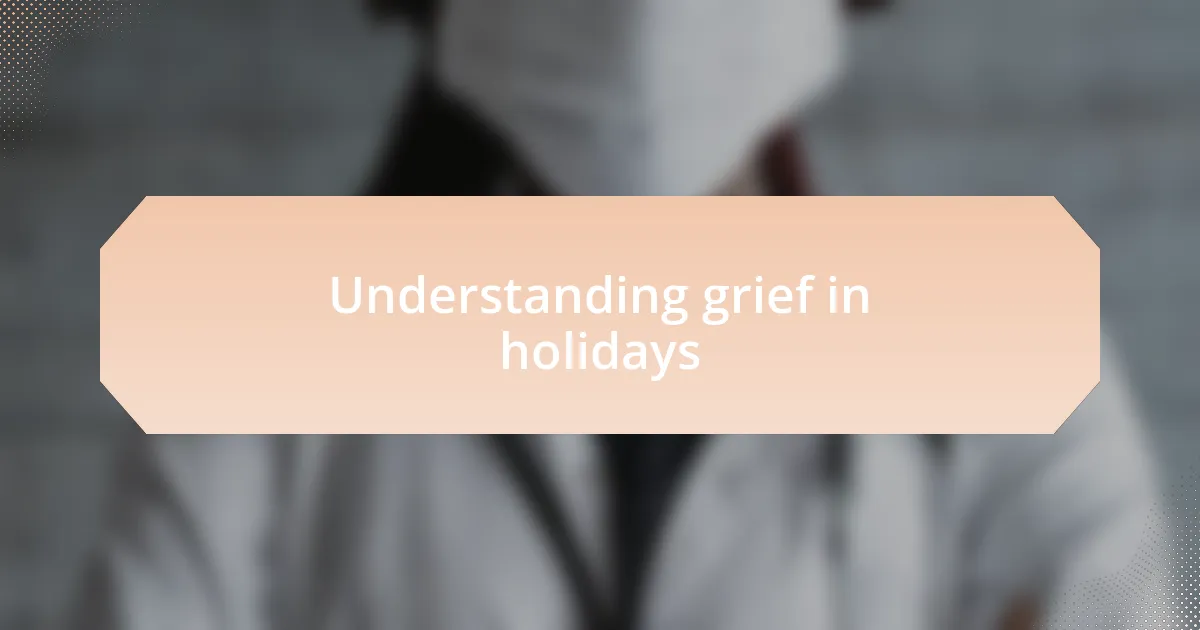
Understanding grief in holidays
Holidays can intensify feelings of grief, bringing back memories of loved ones who are no longer present. I remember one holiday season finding myself overwhelmed as I decorated the tree, pausing to remember the laughter shared during past celebrations. Those moments reminded me that it’s not just missing them that hurts; it’s the recognition of how their absence creates a void during what should be joyful times.
Understanding grief during holidays also means acknowledging that everyone experiences it differently. I’ve seen friends navigate these days with a quiet resolve, while others openly weep, and both responses are valid. Have you ever felt that emotional rollercoaster when the holiday music plays, stirring both warmth and sorrow? It’s crucial to accept that the mix of feelings is part of the healing process.
As families gather to celebrate, grief can sometimes feel like an uninvited guest at the table. I recall a poignant moment when someone shared a story about our departed loved one, igniting laughter mixed with tears around the dinner table. It struck me that commemorating their memory can foster connection, allowing everyone to acknowledge the grief while still embracing the spirit of the holiday.
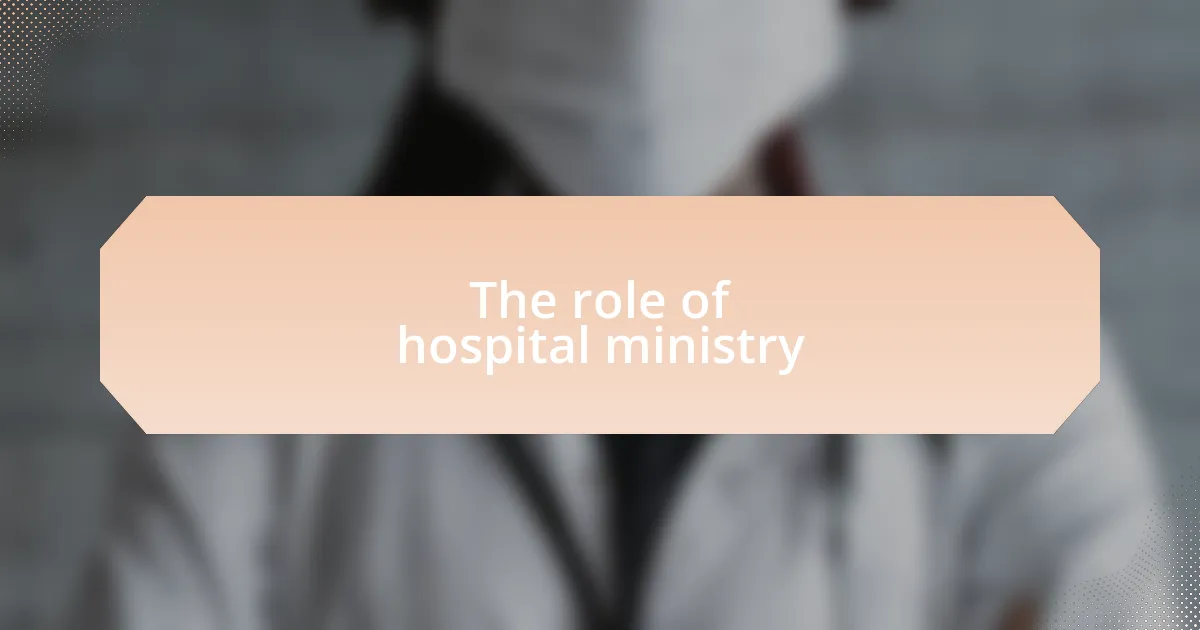
The role of hospital ministry
The role of hospital ministry during the holidays is profoundly significant, particularly for families grappling with grief. I recall a time when a chaplain visited my friend in the hospital over Christmas. Their warm approach transformed the space, turning a sterile room into a sanctuary of comfort, reminding us that connection can still be felt, even amidst sorrow.
These ministries provide not just spiritual support but also practical help, facilitating moments of reflection and remembrance. Have you ever found solace in shared prayers or stories? I remember how gathering in prayer with fellow patients and their families created a collective strength that made our burdens feel just a bit lighter during that tough season. In these shared moments, I discovered that we were not isolated in our grief; rather, we found community in our shared experiences.
Moreover, hospital ministries often organize special holiday events that create a sense of normalcy amid pain. I participated in a small service that included music and candles, allowing us to honor our loved ones. It was incredibly healing to sing familiar holiday songs and share our memories, making the experience not just about loss, but also about the enduring love we carry in our hearts.
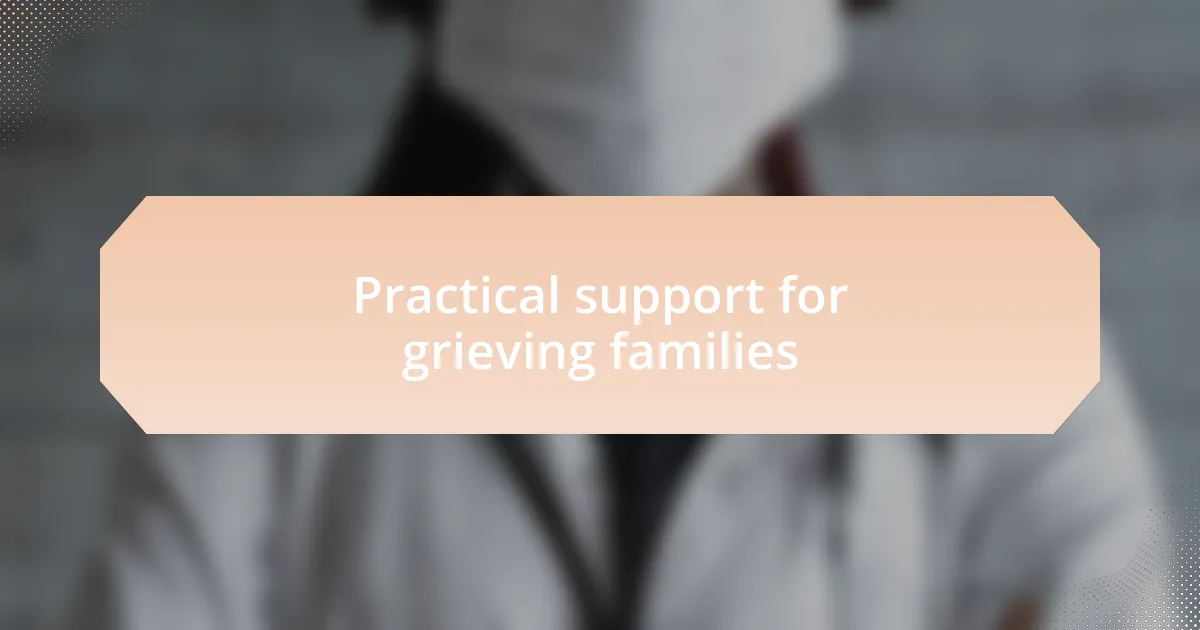
Practical support for grieving families
Practical support for grieving families can take many forms, often beginning with simple yet meaningful gestures. I vividly remember a time when a local church organized meal trains for families who had just lost loved ones. This effort not only alleviated the burden of cooking but also brought a sense of community—knowing that others were thinking of us during our most difficult moments was a powerful reminder we were not alone.
Beyond meals, small acts of kindness can be incredibly impactful. For example, a friend helped me sort through my late father’s belongings one afternoon. As we reminisced about our memories together, it transformed a daunting task into a shared moment of healing. Have you ever found comfort in sharing memories with someone who understands your pain? These types of practical support can foster connection and ease the process of grief, turning the act of remembering into a celebration of life.
Additionally, creating a dedicated space for reflection can provide solace to grieving families. In my experience, setting up a small memorial with photos and mementos at home allowed my family and me to engage with our memories in a tangible way. Have you tried something similar? This simple act can invite ongoing conversations about our loved ones, turning our grief into a shared journey rather than an isolating experience.

Developing a compassionate holiday plan
When planning for the holidays during a time of grief, it’s essential to be gentle with ourselves and consider what would bring the most comfort. I remember crafting a holiday agenda that allowed for both joyful activities and quiet moments of reflection. Have you found that balancing these extremes can help lighten the heaviness? By including time to honor our loved ones—perhaps lighting a candle or sharing a favorite story—we create space for both grief and gratitude.
In my experience, involving family and friends in the planning can make a significant difference. I once organized a small gathering where each person brought a dish that held special memories of those we had lost. This not only filled the table with familiar flavors but also ignited conversations that felt healing and alive. Isn’t it fascinating how sharing our collective experiences can weave a narrative that honors those we miss? This approach not only creates connection but also ensures that our loved ones’ spirits remain a vital part of the festivities.
Additionally, don’t underestimate the power of flexibility in your holiday plans. I’ve learned that being adaptable can ease the weight of expectation during these times. One year, instead of our usual large celebration, we opted for a cozy day spent in pajamas, watching movies and sharing laughter. Have you considered how breaking away from tradition can sometimes lead to healing? It’s these moments of simplicity that can bring unexpected comfort amidst our grief, allowing us to find joy in the little things.
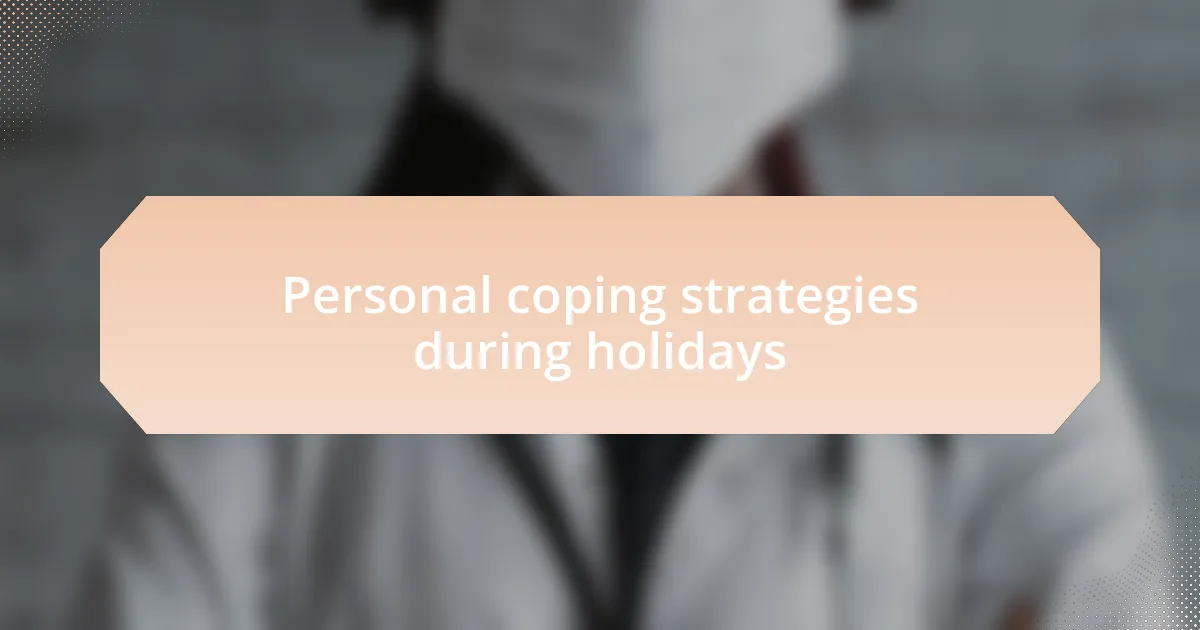
Personal coping strategies during holidays
Finding ways to honor my emotions during the holidays has become one of my essential coping strategies. I remember one particularly challenging season when I decided to set aside time each day for journaling. It was a chance for me to pour out my feelings and memories, and let me tell you, the process of writing down what I missed about my loved ones felt like a comforting embrace. Have you ever tried journaling? It can truly be a powerful release.
Another approach I’ve taken is surrounding myself with uplifting music. In my experience, music has an uncanny ability to transport us, and creating a playlist that includes my loved one’s favorite songs brought me solace. I recall one evening when I played a cherished tune, and the memories washed over me like a warm wave. It’s remarkable how melodies can weave together our past and present—even in grief. Have you thought about how music might serve as a bridge to help you feel closer to those you’ve lost?
Lastly, I’ve discovered the healing potential of volunteering during the holidays. This past season, I joined a local charity event, helping to prepare meals for families in need. It was a fulfilling distraction, allowing me to channel my grief into something positive. Not only did it keep my mind engaged, but witnessing the gratitude from those recipients reminded me of the importance of giving back in memory of those we’ve lost. Isn’t it incredible how turning our focus outward can bring light to our inner struggles?
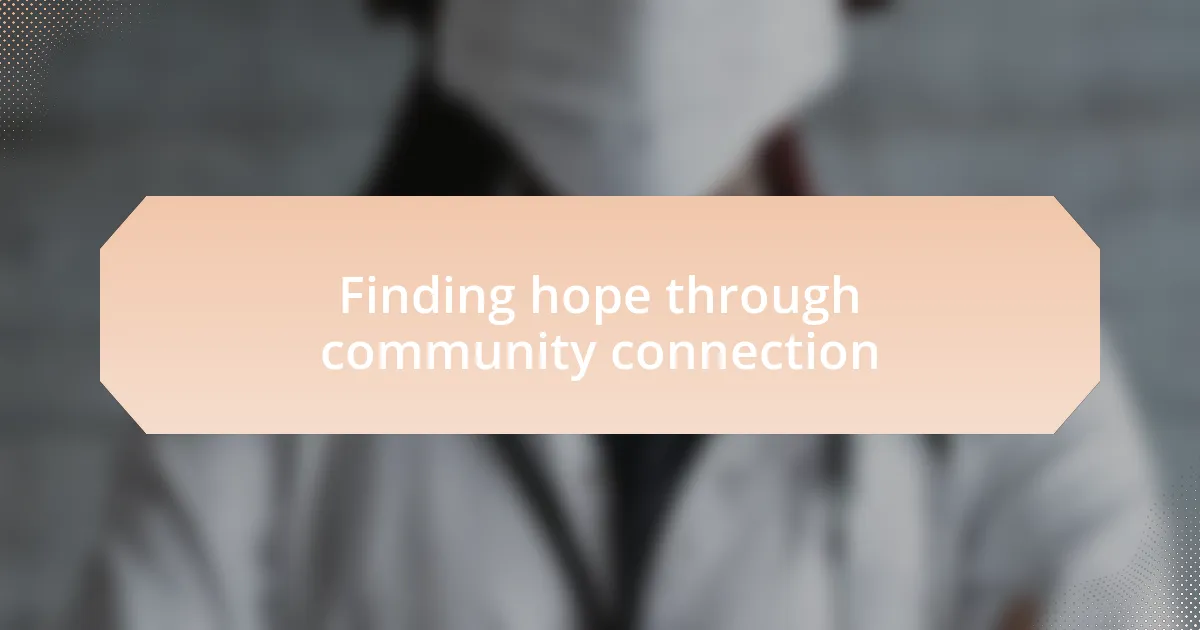
Finding hope through community connection
When I reflect on my journey through grief, I realize the profound impact of community connection. During one particularly tough holiday season, I joined a local support group for those grieving. Each meeting felt like a lifeline; sharing my experiences and listening to others created a bond that I didn’t know I needed. There’s something incredibly healing about being in a space where everyone understands your pain, isn’t there?
Attending community events has also played a significant role in my healing. I remember one evening spent at a candlelight vigil honoring those we’ve lost. As we lit our candles, I felt an overwhelming sense of unity. It was a stark reminder that while grief can feel isolating, we are not alone in our sorrow. Have you ever found solace in a shared moment like that?
Building friendships within my community has shown me the importance of support during holidays. I’ve made it a tradition to reach out to friends, simply sharing a meal or getting together for a game night. These connections illuminate my path, reminding me that hope thrives in companionship. How often do we remember to lean on each other in our darkest times? It’s in those shared laughter and tears that we can begin to heal together.